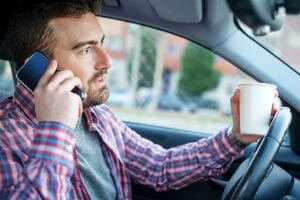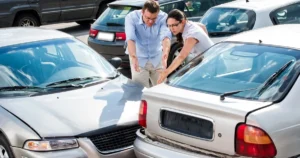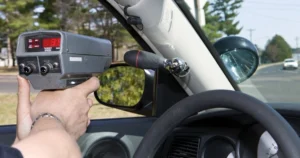 In recent years, distracted driving has become a serious issue in the U.S. Each day, approximately nine people die in auto accidents involving a distracted driver, according to the Centers for Disease Control and Prevention.
In recent years, distracted driving has become a serious issue in the U.S. Each day, approximately nine people die in auto accidents involving a distracted driver, according to the Centers for Disease Control and Prevention.
There are several ways you can become distracted while driving a vehicle. Below, Pfeifer, Morgan & Stesiak’s South Bend auto accident lawyers discuss tips for motorists to avoid distracted driving and practice safe driving methods.
If you believe that you were injured in an accident that was caused by a distracted driver, contact us to schedule a free, nob obligation consultation. We will investigate your claim to determine if distracted driving may have contributed to your accident.
Types of Distracted Driving
There are three types of distracted driving that motorists frequently engage in:
- Visual distractions – This type of distraction occurs when a driver looks at something other than the roadway.
- Manual distractions – A manual distraction includes anything that causes a driver to take his or her hands off the steering wheel.
- Cognitive distractions – Any type of distraction that causes a driver to lose focus on operating the vehicle. This includes mental distractions that result in the driver losing concentration, such as conversing with passengers or becoming lost in one’s own thoughts.
Turn Off Your Cellphone
Cellphone use is one of the most common causes of distracted driving and is extremely dangerous. When you use your cellphone while driving, you become visually, manually and cognitively distracted. This reduces your awareness of your surroundings and significantly increases your risk of causing an accident.
To minimize the risk of becoming distracted by your cellphone while driving, turn off the device before you begin to drive. Be sure to complete your text messages or calls before you leave for your destination. Then, place your cellphone out of reaching distance.
Adjust Your Vehicle’s Features Before Driving
Many vehicles have features that require you to take your attention away from the roadway and driving your vehicle.
To minimize distractions while you drive, be sure to make any adjustments you may need before starting your trip. This includes:
- Setting up your GPS route
- Adjusting your side-view and rear-view mirrors
- Adjusting your seat position
- Finding a radio station
- Adjusting air condition settings
Do Not Drive While Drowsy
The effects of drowsy driving can significantly increase your risk of causing an auto accident. Sleep deprivation can have the same effect on your ability to safely operate a vehicle as driving while impaired by drugs or alcohol. This includes lack of judgment, impaired senses and reduced reaction time.
Before you begin your trip, be sure to get plenty of sleep and rest. Try to get the recommended eight hours of sleep each night. Also, you should consider pulling over to a safe location to rest if you feel tired while driving.
Do Not Multi-Task
While driving, try not to focus on any activity or task other than safely operating the vehicle. Driving requires your full concentration, and trying to manage multiple tasks at the same time reduces your awareness of what may be happening around your vehicle.
Avoid Having Conversations with Passengers
Traveling with multiple passengers is another common type of distraction that reduces your awareness of the roadway.
Although you may have multiple people in your vehicle, try not to engage in deep or frequent discussions. This may cause you to lose focus on driving and increase your risk of causing an accident. Try to limit the number of passengers you allow in your vehicle or make it clear that you cannot engage in conversation with them.
Do Not Eat While Driving
Another common type of distraction is eating or drinking while driving. Typically, eating and drinking requires you to take your eyes off the roadway to focus on your food or drink.
Additionally, eating or drinking while driving requires you to take one of your hands off of your vehicle’s steering wheel. This may affect your ability to react to sudden hazards that appear on the roadway, such as a pothole or another driver.
For these reasons, you should refrain from eating or drinking while driving. Try to finish your meals before you begin your trip and do not bring any food or beverages into your vehicle.
Contact Our Attorneys for a Free Consultation
After an auto accident, you may be confused as to what your next step should be. When this occurs, contact a trusted attorney for help with your claim.
At Pfeifer, Morgan & Stesiak, our South Bend personal injury lawyers will review your claim during a free, no obligation consultation. We will help you determine if you have a case against the at-fault driver involved in your accident. All of our lawyers work on a contingency fee basis, which means you only have to pay us if we recover compensation for you.
Call (574) 444-0741 to get started today.













